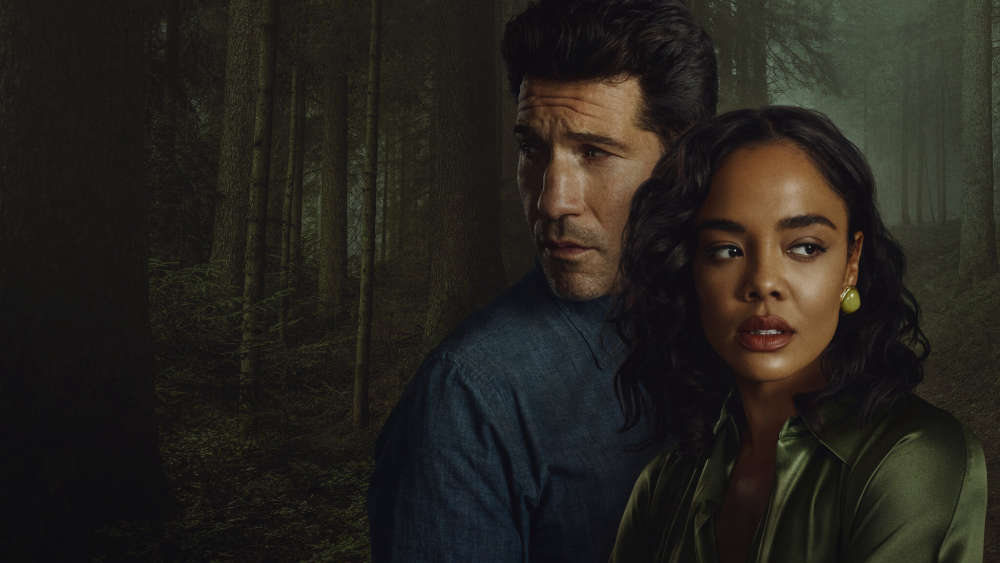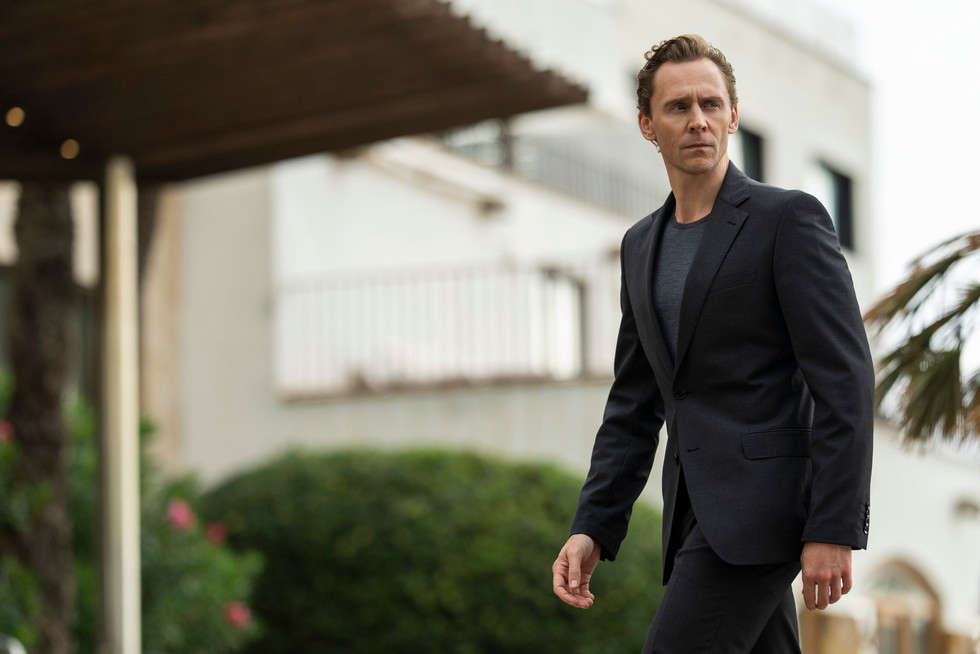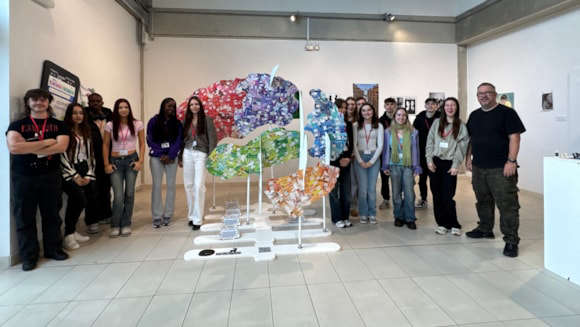Learn more about the local charity as Vibe journalist Juliet Barsby profiles the man using music for positivity and inclusiveness.
After researching Electric Umbrella for the article I wrote about their ‘No Such Normal Day’, I was inspired by the charity’s endeavours. I felt inclined to learn more about Electric Umbrella and its backstory and therefore decided to speak to co-founder Tom Billington in my efforts to become more educated on the charity’s work.
Video-calling me from his Birmingham hotel room, Tom tells me he is currently on tour for Young Voices UK, another inspiring charity delivering high-quality music experiences to children who otherwise lack these opportunities. This is not the only tour Tom has been on, of course; his career has seen him perform all across the world alongside such bands and artists as Razorlight, The Killers, Depeche Mode and countless others. I ask him what began this journey into music, to which he responds that he has always been immersed in music from a very young age. Growing up in Watford, he says, “at the time in the 90s, music felt like a really important thing in the community; there were venues, everyone I knew was learning guitar, and there were a couple of good music shops.” Tom began playing in clubs, such as Watford’s social club, as a young boy, and also did pub cover gigs with his family. He further mentions the musical community in Watford which “really allowed for people [like Tom] to express themselves.” Tom adds that he was much more into amateur dramatics and wearing costumes and makeup, instead of sport; “nothing’s changed there”, he chuckles. After playing in bands throughout all of his teens, Tom realised that he didn’t want to go to university yet didn’t consider music a viable career option. Deciding to take a gap year, he went travelling in Northern India which is where he first worked with learning disabled people. He refers to this work as “life changing”, learning that “music was the key to the door of communicating”; “I realised that I could help other people express themselves, even with the language barrier and cultural differences,” he adds.
After travelling, Tom started the band Mohair which he then spent the next ten years with; touring, gigging, writing songs, and achieving “all sorts of brilliant things,” he says. However, he returned to the world of education after and met Melanie Boda, deciding between them to “devise a particular scheme of work for a project which [they] called Electric Umbrella.” Tom tells me, “quite quickly we realised we had struck upon something our combined skills and interests could really start to make a difference to.”
Intrigued by Tom’s career transition, I ask him what influenced him from working along bands like The Killers, to working in SEN schools? Replying that his experience in India “was key to laying the groundwork,” Tom describes it being “quite intoxicating” realising that all the things he loved so much about being an artist, he could “use to empower somebody else.”
Surprisingly, Tom notes that Electric Umbrella initially started out as a club night. “We met this group of people who were all similar ages to me and I realised how much of a parallel universe these guys were living in, particularly when it came to the ability to express themselves," he explains. Noticing that these people were “being dealt such a cruel hand when it came to their opportunities” and that they were just as great as anyone else, Tom realised that they had “some amazing stories to tell.”
I propose to Tom that the charity’s name could be considered a metaphor for the umbrella of varied support given to the learning disabled people by the team, although he replies that the name was not intentional; rather, very random. Whilst random, the name compliments the charity’s core mission of giving confidence to the community and the mass effect education regarding disability can have on society; it aims to be powerful and ‘electric’ in its endeavours. Essentially, Tom says, “we are about uniting people through music and creating a more inclusive society.”
Electric Umbrella prove their value of inclusivity, offering two different types of music sessions for their members. Tom describes the first, ‘feel the music’, as a session that is “more accessible for people with more profound and multiple learning disabilities”, allowing the team to “operate at a certain pace.” Their other session, coined ‘face the music’ is referred to by Tom as “a little bit more energetic and a little bit more broad.” Essentially, both commit to the role of bringing others together, creating bonds, and “allowing people the space to be exactly who they need to be.” The sessions sound like a brilliant experience for anyone with any type of learning disability, involving group singing, individual performances, lots of technology, even building instruments! Tom envelopes the discussion of the charity’s work, concluding “we are constantly trying to find new ways to unlock and reimagine music for people.”
With such great passion behind these words, I have to ask Tom if there is anything that really stands out among all this brilliant work. He responds, “we have released a lot of records which we weren’t really expecting - that’s been really wonderful, getting to relive that part of my professional past.” Tom also adds that “working in schools has been a total joy, seeing the effects that a group of learning disabled adults can have on a group of schoolchildren.” Diving into the topic of the recent destigmatisation of neurodivergency, Tom notes that children are becoming more understanding that there is no such thing as normal; “they are getting familiar with the idea that their peers have ADHD, or autism which means that they learn differently, and act differently.” Although, adding that every time the charity go on stage, or do a festival, Tom gets the same rewarding feeling, it is unequivocal that the passion behind Electric Umbrella relies on the effects it has on the community. With its ‘No Such Thing as Normal Day’ reaching 10,000 schoolchildren over zoom, Electric Umbrella is exposing and inviting, as Tom says, “an appetite for this feeling of inclusion” which is undeniably exciting.
I ask Tom if there are any personal stories he has that have contributed to the rewarding feeling of being behind such an influential charity. Although he notes there being “so many facets and elements” that feel rewarding, Tom has some inspiring outcomes to share. He expresses that he has known some of the members for ten years now, and has seen their arc; seeing what was expected from them and of them when he first met them in comparison to now, Tom conveys as remarkable. The aforementioned member has been on stage, put records out, been interviewed in the press, gone into schools and given talks about himself and disabilities as a whole and Tom proudly comments that “he wouldn’t be the person he is without the community that we’ve built.”

Another great inspiring example is Tom’s anecdote regarding the effects of Electric Umbrella’s work in schools. Tom explains that the charity educated the children on the way they should treat learning disabled people, that they should “try smiling if you don’t know how to speak to someone in the first place”, and that “you always talk to the person, not the carer.” When a father of one of these children came home after visiting a residential home for learning disabled adults, he admitted to his family that he “freaked out”, and did not know how to interact with the adults. To this, his child consoled him, relaying the information learnt from Electric Umbrella. The father went back to work the following day, Tom says, and described it as “transformative”; the experience motivated him to return to volunteer.
With such a clear significant impact made already, I feel the urge to ask Tom about potential upcoming projects, feeling excited about the future of the charity. Tom discusses his ideas regarding further neurodivergence and disability awareness in the education system, describing his hope for more tangible experiences to further develop children’s understanding of learning disabilities. Revealing his thought process behind the idea, Tom explained that it would also “create great opportunities for the people delivering it”; “our members get to go into these schools and have a real purpose.” Concluding this, Tom states, “for young people to see that happening, to have learning disabled people in a position of authority and leadership, that is exciting to me.”
Knowing of the charity’s song entry for ‘Acceptance’ in the Smiley Charity Film Awards, I commend Tom on the catchy tune and the innovative music video but most importantly, I ask him if there was anything in particular he enjoyed about the experience of writing the song. He discloses that the song was actually written in a hotel room, just like the one he is talking to me from. The process, he describes, was “really exciting”. Interestingly, the experience of producing music during the pandemic completely turned things around for the team. The period of isolation led the team to discovering zoom, which Tom reveals, allowed him to record “naturally and very quickly.”
Although the pandemic was considered damaging for learning disabled people who relied on “interaction and being cared for”, it allowed for the impressive discography of Electric Umbrella. The charity’s songs, Tom notes, have “been written specifically to ask some big questions around inclusion and diversity”; they were “written as starting points for discussion.” The music videos contribute to the mission of inclusivity with “learning disabled people being front and centre, the star of the show.”
To the people of Watford, Tom affirms that donating money is “great”, however, there are other ways you can support the charity and its community too: partnering with the charity as a company and scheduling training sessions for your employees; volunteering with the team; running marathons. Asserting that ‘everybody could be more inclusive and think about others a little bit more’, Tom reveals that this mentality and the work with the charity has been the making of him. Feeling that his previous professional work, although great, feels very self-serving and empty in comparison to Electric Umbrella which has completely boosted his own happiness and own sense of self. Tom ends the discussion with a final message that there are “no ceilings” to anyone; “the only ceilings that someone can have placed on them is external [...] by society.” He adds, “you never know what someone is capable of and if you ever get an opportunity to really see someone for who they are, you should absolutely take it because there’s always more.”


 The Top TV Shows And Films To Watch On This Week (5th - 9th Jan 2026)
The Top TV Shows And Films To Watch On This Week (5th - 9th Jan 2026)
 The Top TV Shows And Films To Watch On This Week (29th Dec 2025 - 2nd Jan 2026)
The Top TV Shows And Films To Watch On This Week (29th Dec 2025 - 2nd Jan 2026)
 The Top TV Shows And Films To Watch On Christmas Day & Throughout The Week (22nd - 26th Dec 2025)
The Top TV Shows And Films To Watch On Christmas Day & Throughout The Week (22nd - 26th Dec 2025)
 Grillo's Grotto in Watford raises money for charity with festive light display
Grillo's Grotto in Watford raises money for charity with festive light display
 The Top Five Films and TV Shows to Watch this Week (15th - 19th December 2025)
The Top Five Films and TV Shows to Watch this Week (15th - 19th December 2025)
 Campaign launches in Hertfordshire to help young people understand the risks of vaping
Campaign launches in Hertfordshire to help young people understand the risks of vaping


